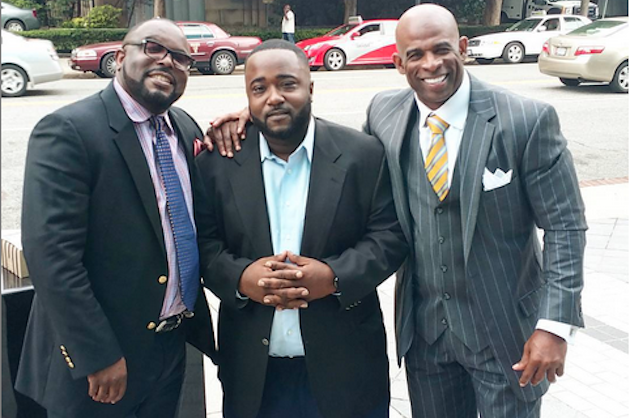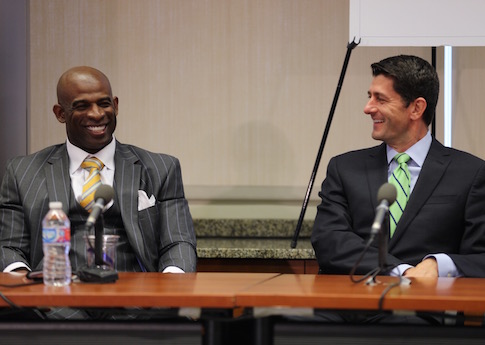Rep. Paul Ryan (R., Wis.) and NFL Hall of Fame member Deion Sanders joined forces Monday to promote changing tactics in the war on poverty that have been successful in neighborhoods across the United States.
"If you want to do better on restoring upward mobility and combating poverty, you have to do what works," Ryan said. "When you get out of [D.C.] and get around real America, you can find things that work."
To find those solutions, Ryan turned to Bob Woodson, whose Center for Neighborhood Enterprise hosted Monday’s anti-poverty forum and has been working to empower neighborhood-based poverty solutions for nearly four decades.
Woodson's type of poverty fighter works hands-on in their community and "runs to the people everybody else wants to run away from" to fundamentally transform them into productive citizens.
The strategy has produced countless success stories, but has not been embraced by a federal government that prefers to measure its success by the amount of money it has doled out to the poor rather than the number of people it has brought out of poverty.
Woodson equates his experience in the war on poverty to being on a "team that has lost every year, yet doesn’t change its coach, players, or playbook" and has "all the best players on the bench."
Woodson introduced Ryan to the players at the root of those success stories on a journey that was shown in "Comeback," a miniseries by Opportunity Lives that told stories of redemption of people who had all but lost hope.
One of those players was Omar Jahwar, who Woodson found working to change the ways of gang members in a Dallas prison and challenged him to take his skills—he once negotiated a peace treaty between the Bloods and the Crips—into the community.
Jahwar now uses the gang members as his ground soldiers in the fight against gang violence in 17 Dallas public schools .
"The most effective tool in deterring violence in gangs is soldiers who are committed and unafraid, but they are usually the most underutilized because people are afraid to talk to the soldiers," said Jahwar, who spoke on a panel at the forum.
Jahwar now works extensively in Dallas with Deion Sanders, who is using his own experience of growing up with an absent father to drive his desire to help single mothers.
"It is my heartbeat and my passion to give single mothers a way up and a way out, not a handout," said Sanders, who last week held an event called Single But Not Alone, which offered resources, such as jobs they could start immediately, to single parents. "That’s how you make a comeback—not by saying ‘I have a check here that’s gonna pay this bill.’"

Ryan said the biggest battle ahead is changing the mindset in society that fighting poverty is a government job.
"What we’re trying to do is break down that mindset and say that everyone, no matter who they are, what their income is, or where they live, they can do something positive and make a difference—and actually in order for us to fix this, they have to," Ryan said. "The federal government can provide resources—and its good at that—but it can’t displace the human interactions, the personal touch that occurs when you do this at the grassroots level."
It was a consensus among the poverty fighters featured on the panel that human touch is the key to generating change in people—and that it is something a bureaucratic social worker can't offer.
"People want to be humanly touched," said Curtis Watkins, who runs a prison-reentry program in Washington, D.C. "We offer that ingredient and it allows people to know that we care about them beyond 9-5. I don't treat the people I am working for as clients—they are friends, fathers, husbands. They are people."
Jahwar calls it an "intrusive model," saying he doesn't send anybody into the restroom to pee in a cup—he goes into the restroom with them.
"You cannot get critical behavior change by treating somebody at arms' length," Jahwar said.
Despite the overwhelming success of all the programs showcased, they are short on funding and have resorted to tactics such as building furniture and selling it to stay in operation. Others rely on charitable donations.
Multiple members of the panel said that the resistance to supporting new tactics in the war on poverty is due to the amount of money that is being made off the current status quo.
"People don't understand how entrenched the poverty industry is in maintaining their control," Woodson said. "There is no rush to come to us now that we have passed the validation test and say, ‘Here is the investment in this great idea of yours.’"
Buster Soaries, former secretary of state of New Jersey, said there is a major difference between Woodson's poverty fighters and a poverty industry that needs to keep people in poverty.
"There is an assumption in each of you that every caterpillar can be a butterfly," Soaries told the panel. "But there is an industry that needs caterpillars to stay caterpillars. There is a vested interest for them in keeping caterpillars."
Sanders also faulted those that are charting the course of current public policy but have never been on the ground in the area they are trying to fix.
"Often times the people that are making these crazy decisions have never set foot in the inner-city unless its for a photo op, and that’s what I have a problem with," said Sanders, who praised Ryan for being "genuine and authentic" about his desire to "provoke change."
"We are really trying to provoke change, and we will provoke change," Sanders said. "But if we could have more help and assistance we could do it expeditiously."
